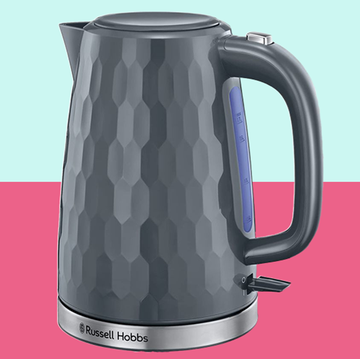I spent several years testing detergent at the Good Housekeeping Institute. That meant morning-after-morning setting off several washing machines at once, dosing each with powders, liquids and gels, not to mention pods. So, there's little I don't know about the best stain removers. The latest laundry phenomenon? Detergent sheets.
Detergent sheets claim to provide a similar laundry experience to the conventional detergent formats, despite having a much more condensed, lightweight design. They look like they sound; small, soft sheets that you tear away to dissolve in the wash.
They've had a mixed reputation in the past for stain removal, but market-leading brands like Dr. Beckmann have stepped it up in recent years, not just with its detergent sheets, but with fabric conditioner sheets too.
What to read next
Here's why it might be time to swap to sheets.
5 reasons to make the switch
1. Less of an environmental impact
The biggest and most obvious advantage of detergent sheets is the environmental impact – or lack thereof. Sheets weigh much less than your typical powders and liquids. For instance, Dr. Beckmann says 50 sheets (up to 50 washes) weighs 200 grams, whereas a typical bottle of liquid detergent with a similar wash capacity weighs around 1.5kg. That’s a huge difference to carbon emissions during manufacturing and transport.
They also tend to use less plastic in the packaging by comparison. Some detergent sheet brands, such as The Lab Co and Tru Earth are even plastic-free, with cardboard packaging that's recyclable at home. The formulations can be biodegradable and vegan too, and even free from harsh chemicals, although that depends on the brand.
2. All the convenience of pods – but without the price
I generally don’t use pods at home, mainly because of the steep price point. But I do love the convenience they provide – you just bung one or two into the drum, set the cycle and you’re good to go, no dosing required. That also saves you from cleaning out the detergent drawer every few weeks.
With detergent sheets, you get that same convenience, but without the hefty price tag – and you avoid the spills that come with liquids and powders. Of course, this depends on the brand, but generally speaking, one capsule costs around 25p while one sheet is usually around 20p. That said, the price does vary widely – during my research, I found one priced from as little as 10p, but another as high as 45p – so check this before you buy. Shopping in bulk will generally reduce the price in both cases.
3. Less storage space
Liquids, powders and pods all take up a substantial amount of storage space in the utility room. Even if you transfer them into stackable containers, the footprint still far exceeds that of detergent sheets. Detergent sheets are paper-thin by comparison, and the packaging is flat and minimal. This saves bulky bottles and boxes from crowding up the shelves. This also makes detergent sheets ideal for travel as you can flat-pack them.
If you want to save even more storage space, fabric conditioner sheets are an option too (not to be confused with dryer sheets). You pop these in the drum with the detergent sheets and they help to soften the load and add fragrance; something that's generally lacking with detergent sheets. I tried Dr. Beckmann’s new fabric conditioner sheets and found they made things smell fresh and fragrant without overwhelming. Plus they’re suitable for sportswear, which is a bonus (usually fabric conditioner isn’t). You can even buy the fragrance to match and intensify the fragrance from the detergent sheets you’re using.
4. Ideal for everyday washes
Detergent sheets aren’t ideal for heavy stain removal. Bio powders are generally still the best option for that. However, detergent sheets will more than suffice for everyday washes.
When tested at the GHI, Dr. Beckmann’s Magic Leaves Bio Laundry Detergent Sheets removed at least 80% of the stains from cotton and polycotton. The smell didn’t overpower and it dissolved well, leaving no traces in the load. However, colours were dulled somewhat and whites weren’t the brightest. If colour retention is what concerns you, Dr Beckmann also offers Colour Protect Laundry Detergent Sheets, which scored highly in this area.
It's worth adding that when I tried the Dr. Beckmann Detergent Sheets for myself, I did find the occasional sheet ended up stuck to the inside of the door and needed cleaning off after use. This could be because I was using twice the usual amount (as was requested for hard water). Or it might be that the temperature of the wash wasn’t high enough to break it down fully. I didn’t have this problem when using a standard dosage and was pleased with the overall results.
Detergent sheets are available in both bio and non-bio formats, so you can choose appropriately depending on the sensitivity of your skin. Some are also suitable for hand washing and dissolve at temperatures as low as 20 degrees, which makes them ideal for washing delicate items too, although you should always check the material is suitable before use.
5. Tear away as much as you need
A major difference between detergent sheets and pods, is that the sheets are often perforated so you can tear them in half. This means you’ve got a better control over the dosage. While pods only let you throw in one or two whole capsules, with sheets you can work your way up in increments, saving potential waste. You could even take a pair of scissors to break it down further if desired. This gives you a similar level of dosage control to powder and liquid detergent, but without the mess.
This comes in use for hand washing, where you only need a small amount of detergent. And it’s useful when you’re dealing with hard water, when extra detergent is required, but a whole extra sheet is just too much.
Verdict
With better stain removal, it’s getting difficult to ignore laundry detergent sheets. It’s true that they’re not yet as strong as the powder and liquid alternatives, but they’re now more than sufficient for everyday stains – making them suitable for most wash cycles.
Considering this, the storage space you’d save and the convenience they provide, not to mention the wallet-friendly price-point, why wouldn’t you want to try them? Ignoring all that, the ecological reasons alone are enough to warrant the switch in my opinion.






















